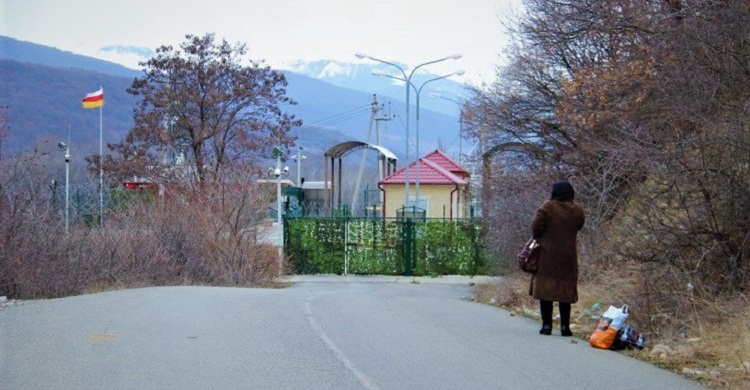De facto Tskhinvali authorities partially lift movement restrictions over administrative line

Georgia’s occupied Tskhinvali (South Ossetia) region will open two crossing points over the administrative boundary to allow free movement for the local population starting on Saturday. Photo: EUMM Georgia press office
The de facto authorities of Georgia’s Russian-occupied Tskhinvali (South Ossetia) region will partially lift restrictions on crossings of the administrative line separating the region from the rest of Georgia starting on Saturday, the Georgian State Security Service said on Friday.
Authorities in the occupied region will open two crossing points over the line that have been closed for almost three years, the Service said based on information provided by the European Union Monitoring Mission in Georgia.
The security agency said the two crossing points, Razdakhani and Perevi, would be opened between the 20th of every month and the last day of the month, until the end of this year, allowing the local population living in the occupied Akhalgori and Java regions to cross the line.
The removal of illegal restrictions on free movement was one of the main questions discussed at the Incident Prevention and Response Mechanism meetings. The issue was continuously raised by the central Georgian Government at the meetings of the Geneva International Discussions [on issues of Georgia’s conflict-affected regions]”, said the SSS.
The agency reiterated that Illegal restrictions imposed on free movement in the occupied territories and along the occupation line “significantly complicate the life of the local population and damage the security environment”, and placed “full responsibility” on the occupation authorities for the violations.
 EUMM patrolling near Chorchana during the 2019 tension. Photo: EUMM Georgia press office.
EUMM patrolling near Chorchana during the 2019 tension. Photo: EUMM Georgia press office.
The crossing points were closed by the decision of then de facto President Anatoly Bibilov in September 2019, in response to the opening of a police post in the central Georgian village of Chorchana, located near the occupation line in the Khashuri municipality, in late August of that year.
Bibilov claimed the police post posed “serious threats to the Republic of South Ossetia” and demanded its “immediate demolition”.
Since then the crossing points have been opened only intermittently in emergency situations, with observers noting the harm caused by their closures to the local population who buy everyday items, receive medical aid or higher education on the Georgian-controlled territory.
The movement ban particularly deteriorated the humanitarian situation during the coronavirus pandemic, when several individuals died in the region due to the absence of necessary medical services.
 Tweet
Tweet  Share
Share